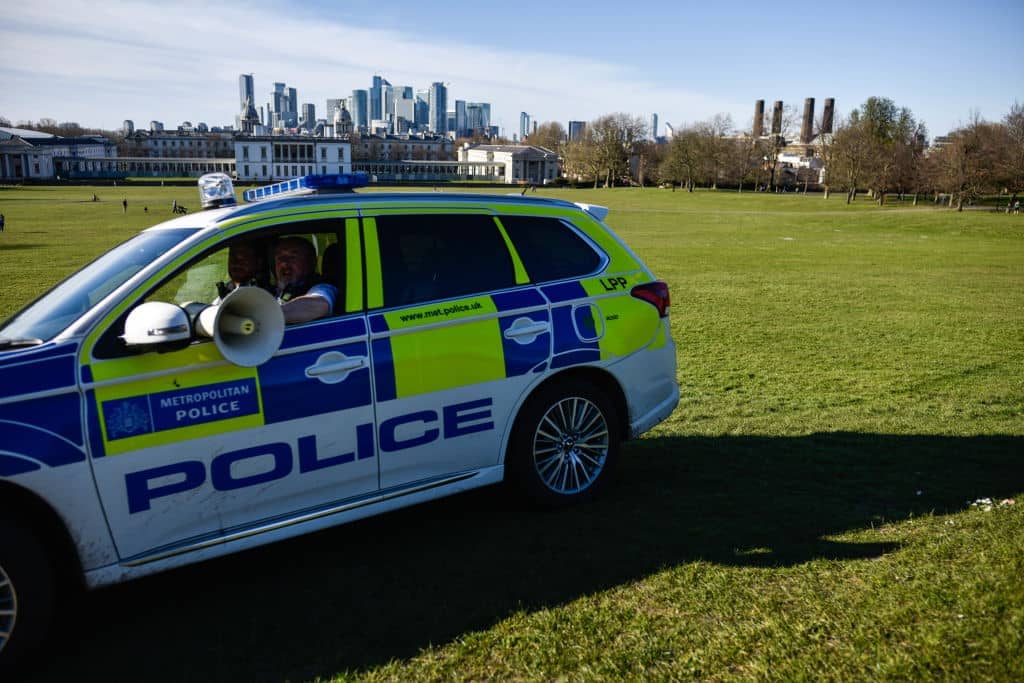As Boris Johnson battles to survive the Partygate scandal and faces widespread anger from the public and his own MPs, he is still hoping his apology over the Downing Street festivities will be enough. But the Prime Minister has to face up to the fact that, for thousands of people around the country, saying sorry or offering excuses for Covid lockdown rule breaking didn’t cut it. Many ordinary Brits were criminalised for breaking the law during the pandemic, sometimes in very sad and desperate circumstances.
The case of a 23-year-old woman from Eltham, in south east London, draws a striking parallel with an accusation levelled against the Prime Minister over the Downing Street garden party on 20 May 2020. Johnson claims to have walked into the event while unaware that it was against the rules. Similarly, the woman said she went to ‘drop off a birthday card’ for a friend she had been helping with childcare, and ‘didn’t realise there would be other people present’.
‘I apologise for breaking the Covid rules, it was not intentional. Matters got out of hand and I could not avoid it.’ Despite her pleas, the court fined her £250.
Court documents also reveal how a Brockley pensioner was fined £100 for meeting friends at his allotment in January 2021.
One person who broke the rules on seeing friends offered the mitigation that he ‘did it because I didn’t want to be alone’
‘I am a sick person with heart failure and other problems’, he said. ‘I went to the allotment to get some greens as I don’t eat meat. I am a pensioner struggling to pay my way, and in debt already. I did not wish to break the law as if you check I have no criminal record since school over 50 years ago.’
While Downing Street awaits Sue Gray’s report on the alleged lockdown parties – with the Met Police stubbornly sitting in the wings – London’s courts continue to dish out tens of thousands of pounds worth of fines to members of the public for pandemic infringements. Amid the flagrant breaches at mass demonstrations and all-night raves, there are stories of people who say they unintentionally broke the rules, were struggling with their mental health, and gripped by the loneliness of lockdown – all facing criminal prosecution.
Johnson and his cabinet colleagues held nightly press conferences to impress the importance of the rules, threatening ‘strict enforcement’ and £10,000 fines. Police officers went out with those words ringing in their ears. The result is a conveyor belt of prosecutions, barely noticed by the public or acknowledged by politicians, of thousands of people left with criminal records for their actions. Unlike the Prime Minister and his aides, they did not have the benefit of waiting for an internal investigation. Instead they faced a police officer’s snap decision on whether they should be fined and prosecuted.
The scandal at Downing Street has shone a light on court action, sparking calls for an end to Covid prosecutions and even demands that those who have already been penalised should get their money back. When the government decided to use the law to enforce its lockdowns, the expectation was it would apply equally regardless of office, status, or position. The revelations from Downing Street call this into question.
So what does Boris have to say to the woman from Catford, south east London, who was reported to police by a neighbour over a birthday party? She pleaded with the court for leniency as she was fined £120 for breaking Tier 4 rules: ‘I am unemployed and can barely afford to survive’, she said. ‘My friend was part of my social bubble because we were both extremely lonely and depressed.’
Another person who broke the rules on seeing friends offered the mitigation that he ‘did it because I didn’t want to be alone’.
The inconvenient truth for Boris Johnson is his own government’s pandemic laws were used unyieldingly against thousands of people, whether or not they had set out to flout the rules. The chef at a wine bar in Brockwell was fined £1,200 for the behaviour of his customers. ‘My ignorance is not an excuse’, he said, holding his hands up to a Covid-19 crime. ‘As the chef of the restaurant I will take the blame.’
The undoubted low point of Partygate came with the revelation of two Downing Street leaving dos on the night before Prince Philip’s funeral, forcing the Prime Minister into a grovelling apology to the Queen. Meanwhile, a Hackney woman who threw a party on the day of the funeral itself ended up with a £12,000 fine, as well as the opprobrium of the police for her ‘totally unacceptable and disrespectful’ actions. While the Prime Minister’s apology was no doubt humiliating, it is not on the same level as a criminal prosecution. Many struggle to understand why the Met Police is resisting calls to even investigate the goings-on at Downing Street.
The government’s travails have brought a focus on Covid-19 prosecutions, which have slipped largely under the radar due to the opaque way in which they have been prosecuted. Most cases are dealt with behind-closed-doors in the Single Justice Procedure (SJP), which is normally reserved for punishing people for low-level crimes such as littering, speeding, and dodging train fares. In this secretive process, I have discovered magistrates misunderstanding the Covid laws, a defendant prosecuted despite being told ‘case closed’ by police, lockdown breakers threatened with Tasers by over-zealous officers, and offenders left with five-figure fines that will take more than a decade to pay off. This only adds to the sense of injustice in the system.
While some, in the wake of Partygate, are demanding an amnesty on Covid prosecutions and rebates for those who have been fined, the least we should expect is an equal system, whether you live in Hackney, Catford, or Downing Street.






Comments